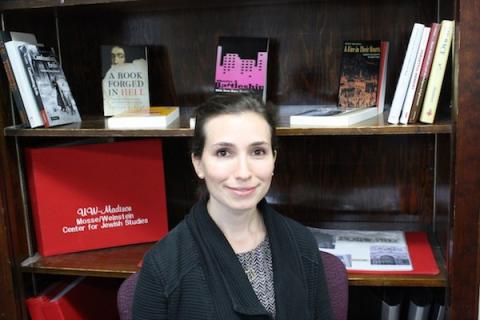New Faculty Focus: Sunny Yudkoff
Title: Assistant Professor of Jewish Studies and German, Nordic, Slavic
Why did you decide to come to the University of Wisconsin Madison? The University of Wisconsin–Madison is an amazing place to teach and study Yiddish literature and culture. The Yiddish collection at the library is strong — and it’s growing! Many students are also surprised to learn that UW–Madison is now home to one of the largest group of scholars engaged in various aspects of Yiddish culture — from Yiddish labor history, to Yiddish poetry, to the legacy of Yiddish song. And, Wisconsin itself has historically been home to a number of Yiddish-language activists and writers.
What is one thing students should know about you? I didn’t start studying Yiddish until I was a junior in college. This just goes to show you how one course can change your life!
What courses do you teach and which are you most excited about? I teach courses in the Jewish Studies program, the Department of German, Nordic, and Slavic, and the English Department. These courses all incorporate my passion: Yiddish literature. These courses also range in subject from the medical humanities (Eng 182. The Autobiography of Illness) to comparative Jewish literature (Lit Trans 229: Representations of the Jews in Eastern European Cultures, Topic: Writing the Jewish Body). I also teach courses on Jewish American literature that covers material from the mid-nineteenth century until today. This semester, I’m particularly excited about teaching English/Jewish Studies 593: The Literature of Jewish Identity in America. In this class, we’re reading a number of exciting texts with angry authors who take impassioned positions about topics from race to religion to politics. The subtitle for the course is, “The Literature of Angry Jews: From Saul Bellow to Bernie Sanders.” Right now, we’re reading Philip Roth’s 1969 novel, Portnoy’s Complaint. In future years, I’ll also be teaching Yiddish language here on campus.
What motivated you to study language and culture? Studying a new language opens you up to a whole set of “new normals.” Before I started studying Yiddish, I thought it was a language of jokes. Now I know it was the language of millions of Jews across the world — from Russia to the U.S., from Germany to Mexico, and from England to Israel. It was the language people ate in, fought in, and slept in; it was the language of rabbis, homemakers, modernist poets, and soldiers; in short, it was the language of daily conversation and intellectual life. Every language I study opens me to up to a series of similar “new normals” and expands my understanding of how language and culture interact.
What are you research interest areas and why? I research the history of Hebrew and Yiddish literature. Specifically, my first book project is called, Let it be Consumption!: Tuberculosis and the Modern Jewish Writer. The book examines how early twentieth-century Jewish writers used their diagnoses of tuberculosis — at the time, a fatal disease — to augment their reputations and build their reading audiences. The work combines archival research with literary analysis, demonstrating how discussions of public health and literary production intersect and influence each other. The work follows writers who lived, worked, and recuperated across the globe—from northern Italy to Denver, Colorado!
What are some of your other hobbies? In addition to reading, I’m an avid moviegoer. Luckily, Madison has so many great cinemas to watch new movies—from the biggest blockbusters to the newest documentaries.
Tags: faculty

